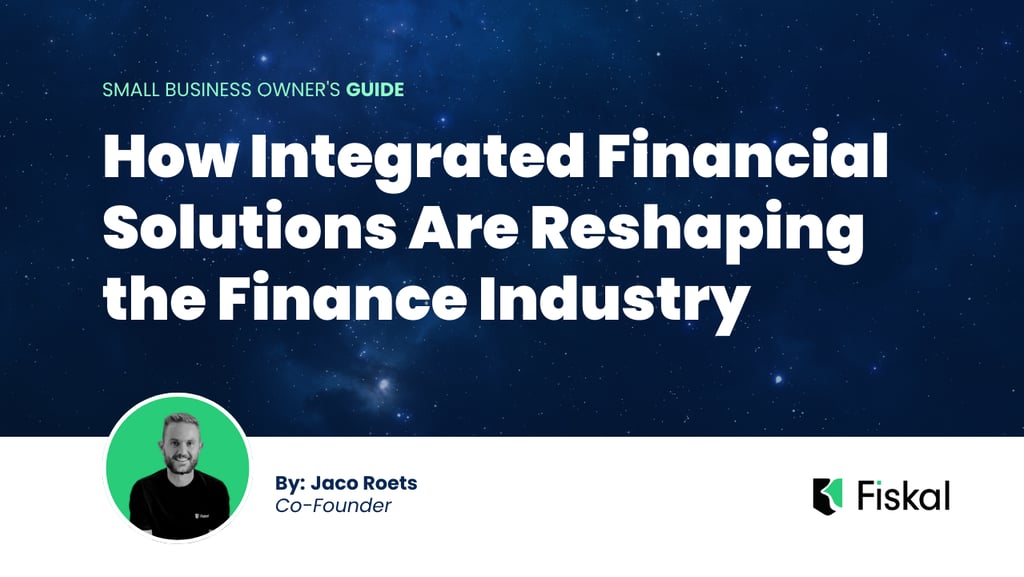Beyond Traditional Banking: How Integrated Financial Solutions Are Reshaping the Finance Industry in 2024
In 2024, the finance industry is poised for a groundbreaking transformation as it moves beyond traditional banking and embraces integrated financial solutions. These innovative approaches are revolutionizing the way individuals and businesses manage their finances, providing a more convenient and efficient experience. With the rise of digital technology and the increasing demand for personalized financial services, the finance industry is undergoing a significant shift.
SYSTEMS AND SOFTWARE


Integrated financial solutions offer a holistic approach to banking, bringing together various financial services and products under one platform. This integration enables customers to seamlessly handle their banking, investments, insurance, and other financial needs in a single place. By eliminating the need to deal with multiple providers, customers can save time and simplify their financial management.
Integrated financial solutions leverage advanced technologies such as artificial intelligence and machine learning to deliver tailored recommendations and personalized experiences. These technologies analyze customer data and financial behavior to offer customized solutions that meet individual needs and goals.
With integrated financial solutions reshaping the finance industry, traditional banks and financial institutions are facing increasing competition from digital disruptors and fintech startups. To stay competitive, banks and institutions need to adapt and embrace these integrated solutions to meet the evolving demands of customers in 2024 and beyond.
The shift in the finance industry towards integrated financial solutions
The finance industry is experiencing a significant shift towards integrated financial solutions. Traditional banking, with its separate entities for banking, investments, insurance, and other financial services, is being replaced by integrated platforms. These platforms bring together various financial services and products, offering customers a seamless and comprehensive experience.
One of the key drivers behind this shift is the increasing demand for convenience and efficiency. Customers no longer want to deal with multiple providers for their financial needs. They want a one-stop solution that allows them to manage their finances in a hassle-free manner. Integrated financial solutions cater to this demand by providing a unified platform where customers can access a wide range of financial services.
Moreover, integrated financial solutions leverage technology to deliver a personalized experience to customers. Through the use of artificial intelligence and machine learning, these solutions analyze customer data and financial behavior to offer tailored recommendations and solutions. This level of personalization enhances the customer experience and enables individuals to make more informed financial decisions.
Benefits of integrated financial solutions for consumers
Integrated financial solutions offer numerous benefits for consumers. Firstly, they provide convenience by allowing customers to access and manage all their financial services in one place. Whether it's checking their bank balance, making investments, or purchasing insurance, customers can do it all through a single platform. This saves time and eliminates the hassle of dealing with multiple providers.
Secondly, integrated financial solutions enable customers to have a holistic view of their finances. They can easily track their spending, monitor investments, and analyze their overall financial health. This visibility helps individuals make better financial decisions and plan for their future.
Additionally, integrated financial solutions offer personalized recommendations based on individual financial behavior and goals. By leveraging advanced technologies, these solutions can suggest investment opportunities, insurance coverage, and savings strategies that align with the customer's objectives. This level of personalization enhances the customer experience and improves financial outcomes.
Benefits of integrated financial solutions for businesses
Integrated financial solutions also offer significant benefits for businesses. Firstly, these solutions streamline financial operations by consolidating various financial services into one platform. This simplifies financial management and reduces administrative burdens for businesses, allowing them to focus on core activities.
Secondly, integrated financial solutions provide businesses with real-time access to financial data and analytics. This enables them to make data-driven decisions and gain insights into their financial performance. With the ability to track cash flow, monitor expenses, and analyze financial trends, businesses can optimize their financial strategies and improve profitability.
Moreover, integrated financial solutions facilitate seamless payment processing for businesses. Whether it's accepting online payments, managing invoices, or handling payroll, these solutions offer efficient and secure payment options. This improves cash flow and enhances the overall financial efficiency of businesses.
Trends in integrated financial solutions for 2024
As we move into 2024, several trends are shaping the landscape of integrated financial solutions. One key trend is the increasing adoption of mobile banking and finance apps. With the majority of customers using smartphones for their financial needs, mobile apps offer a convenient and accessible way to access integrated financial services.
Another trend is the integration of blockchain technology into financial solutions. Blockchain provides secure and transparent transactions, making it ideal for applications such as cross-border payments, identity verification, and smart contracts. As blockchain technology matures, it is expected to play a significant role in the development of integrated financial solutions.
Furthermore, there is a growing focus on sustainability and responsible investing in integrated financial solutions. Customers are increasingly interested in investing in companies that align with their values and contribute to a sustainable future. Integrated financial solutions are incorporating environmental, social, and governance (ESG) factors into their investment recommendations, allowing customers to make socially responsible investment choices.
Examples of successful implementation of integrated financial solutions
Several companies have successfully implemented integrated financial solutions to cater to the evolving needs of customers. One such example is Revolut, a digital banking platform that offers a range of financial services, including banking, investments, and insurance. Revolut's platform provides a seamless experience for customers, allowing them to manage their finances in one place.
Another example is Wealthfront, a robo-advisor that offers integrated investment and financial planning services. Wealthfront's platform leverages artificial intelligence to provide personalized investment recommendations and financial planning advice. This integrated approach has gained popularity among tech-savvy investors looking for convenient and efficient financial solutions.
Challenges and risks of integrated financial solutions
While integrated financial solutions offer numerous benefits, they also come with challenges and risks. One challenge is ensuring the security of customer data and transactions. As integrated platforms handle a vast amount of sensitive financial information, it is crucial to have robust security measures in place to protect against data breaches and fraud.
Another challenge is the need for regulatory compliance. Integrated financial solutions operate in a highly regulated industry, and it is essential to adhere to legal and regulatory requirements. This includes complying with anti-money laundering (AML) and know-your-customer (KYC) regulations, as well as data privacy laws.
Additionally, there is a risk of over-reliance on technology. Integrated financial solutions heavily rely on advanced technologies such as artificial intelligence and machine learning. While these technologies enhance the customer experience, there is a risk of technology failures or glitches that could disrupt financial services and impact customer trust.
How to choose the right integrated financial solution for your needs
When choosing an integrated financial solution, it is important to consider several factors. Firstly, assess your financial needs and goals. Determine which financial services are essential to you, such as banking, investments, insurance, or budgeting tools. This will help you narrow down your options and choose a solution that aligns with your requirements.
Secondly, evaluate the features and functionalities of the integrated financial solution. Consider factors such as user experience, compatibility with your devices, customer support, and security measures. Look for a solution that offers a seamless and intuitive interface, as well as robust security protocols to protect your financial information.
Additionally, consider the reputation and track record of the provider. Research customer reviews and ratings to get a sense of their reliability and customer satisfaction. Look for providers that have a strong reputation in the industry and a proven track record of delivering quality financial services.
The future of integrated financial solutions in the finance industry
As we look ahead, the future of the finance industry is undoubtedly intertwined with integrated financial solutions. With the increasing demand for convenience, personalization, and efficiency, these solutions are set to become the new norm. Traditional banks and financial institutions will need to adapt and embrace these integrated solutions to stay competitive and meet the evolving needs of customers.
Furthermore, advancements in technology, such as artificial intelligence, machine learning, and blockchain, will continue to drive innovation in integrated financial solutions. These technologies will enable even greater personalization, security, and efficiency in managing finances.
In conclusion
Integrated financial solutions are reshaping the finance industry in 2024 and beyond. These solutions offer a holistic approach to banking, providing customers with convenience, personalization, and efficiency. As the finance industry evolves, traditional banks and institutions must embrace these integrated solutions to meet the changing needs of customers and stay competitive in the digital age.
Reach out to one of our experts at Fiskal to discuss some of these tools that might help your business run smoothly.












